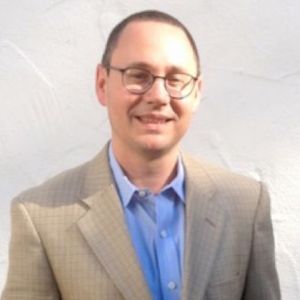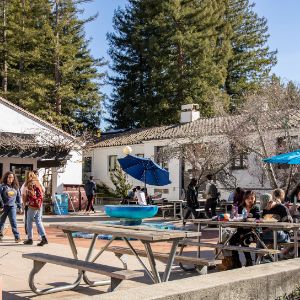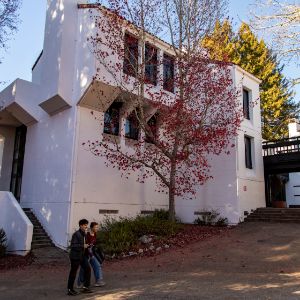To reach Crown College on foot, make sure you’re wearing sensible shoes and you’re ready for a lung-buster, because you’ll be climbing the campus’s notorious “Cardiac Hill.” One, two, three, and about what feels like 100,000 steps later, you’ll find yourself at the northeast end of campus, where the college sits nestled in a grove of redwood trees.
Crown’s academic and residential buildings share the same stark white exterior and brownish-red tile roofing, which can be seen from far away, even on a foggy day. Maze-like pathways split off into various quads offering an array of places for students to study, socialize, or relax.
Students interact in and around the dining halls and Fireside Lounge, a designated space for Crown students to meet for group work and studying. Residence halls host various activities centered around student interests like socials, video game nights, and movie nights.
“Crown College is a pretty quiet college with a very good academic environment,” said Emily Kobayashi (Crown ‘19, bioinformatics).
But this low-key, close-knit community has an oversized impact on undergraduates.
UC Santa Cruz Alumni Council member and pioneer class graduate Susan Nerton (Crown ‘71, psychology; ‘87, computer and information science) had a life-changing experience at Crown. She remembers walking out to the lawns that surround the college and seeing a community of bright students excited to be there.
“There was a lot of face-to-face time together, impromptu get-togethers with faculty and other students, and the education was unbelievable,” Nerton said.
Vision of a science community
Crown’s science culture began over 50 years ago. The college was founded in 1967 through public funds and a generous gift by the Crown Zellerbach Foundation, which supports organizations making positive impacts in their communities. Kenneth Thimann, Crown College’s founding provost, was a plant physiologist who came from Harvard University with a vision to create UC Santa Cruz’s first college dedicated primarily to the sciences. To this day, Crown holds on to its science legacy and strong community of driven students, who call themselves Crownies. Most major in one of the science, technology, engineering, or math (STEM) fields and are involved in cutting-edge research.
Further enhancing the college’s science culture, the residential buildings are named after famous scientists like Galileo, Maxwell, and Harvey, just to name a few. Inside the residence halls, student-drawn murals, comic art, mathematical equations, and inspirational phrases line the walls.
There is also a sizeable population of non-science Crownies who seek out Crown’s interdisciplinary approach to education. The mix of students brings different perspectives to the coursework and allows for deeper conversations to develop.
“The student body is extremely diverse, and they really care for each other,” said Crown Core lecturer Marilyn Patton. “They look beyond labels immediately.”
Science, Technology, and Society
Crown’s theme is Science, Technology, and Society. Students examine the social impacts of technology and its ethical implications. Crown faculty understand that students must go beyond the technical aspects of science to effectively navigate the complexity of today’s world and become responsible citizens.
“Today’s technology is really the product of a long history, of a philosophical framework, of economic interests, and has both positive and negative implications for us as individuals and as a society,” said Manel Camps, Crown College provost and associate professor in microbiology and environmental toxicology.
Crown’s 10-week core course, commonly referred to as Core, is a required five-unit class for first-year students. This interdisciplinary class examines the social impacts of emerging technologies like artificial intelligence (AI), surveillance technology, social media, transhumanism, and self-driving cars.
“Crown’s core class places technology in its intellectual and social context,” said Camps.
Drawing from old and new texts, students complete writing assignments, take part in online discussions, and complete a research project in groups of five to six.
Students also have a chance to show off their creative talents. Faculty encourage their students to write flash fiction, short science fiction stories that indirectly refer to the topics they learn about in their core course and science classes. Stories are reviewed by a science fiction writer and then published.
“Suddenly students are going far beyond equation-solving to dreaming of scenarios that might happen in the future,” Patton said.
Following recommendations from the college’s Alumni Council, Crown is encouraging further alumni engagement in the classroom. A group of alumni have already started to support Core through participation in classroom discussions and by providing mentorship during the research project component of the course.
Students complete Core with foundational academic skills preparing them for rigorous coursework, and a valuable network of alumni mentors and peer connections.
Trailblazing programs
Crown is one of the colleges that hosts classes for the College Scholars Program, a prestigious program that immerses students in challenging coursework and research. Students can choose from a number of interdisciplinary courses.
Crown’s College Scholars classes have a unique focus on foundational career competencies such as digital literacy, teamwork, and problem solving, which are transferable skills between different disciplines and highly sought out by employers.
“We recruit lecturers outside of academia to teach subjects that are narrowly represented on campus, offering our students a unique window into industry-related, professional careers,” Camps said.
Crown hosts two entrepreneurship classes, which attract many students in and out of the college. One of the classes focuses on for-profit organizations, while the other focuses on social entrepreneurship.
Crown also hosts its own Social Fiction Conference. This event, building on the college’s theme of Science, Technology, and Society, ties together Crown’s academia and residential education to provide students with the opportunity to showcase their creative work. Kobayashi, the recent bioinformatics graduate, presented a screening of her fictional stop-motion film on mind-cloning rights during her first year.
“In my video, I got to talk about a lot of themes we discussed in the core class,” Kobayashi said.
As Kobayashi prepares for her Ph.D. program in bioinformatics and systems biology at UC San Diego, the teachings of Crown College still resonate with her.
“I will still stop and think, ‘What about the ethics?’” she said.
Deeply involved alumni
Through grassroots fundraising, Crown College’s pioneer class raised $75,000 to fund the college’s library renovations. Crown alumni launched the fundraiser in 2016 in honor of Crown’s upcoming 50th anniversary, which took place a year later. They were responding to a critical need. The library was deteriorating and students were running out of spaces to meet.
Other generous contributions from alumni and donors went toward enhancing Crown’s educational experience through renovations to the Fireside Lounge; Core re-transformation that resulted in smaller class sizes and the addition of co-curricular activities; increased mentored internship opportunities; and the expansion in the number and variety of classes offered at Crown.
“The experience of students is paramount,” said Henry Chu (Crown ‘72, history), a UC Santa Cruz Foundation trustee. “Enrichment of education for these kids is my hope and goal, whether it’s by space or by opportunity or by curriculum.”
To strengthen the permanent stream of resources available to enhance the Crown student experience, the Crown Alumni Council is in the planning phase of an endowment campaign. The goal is to add $1 million to the Crown endowment by 2021, the 50th anniversary of Crown’s first graduating class.
Interested in learning more about Crown College? Watch the Crown College: 50 Years of Nurturing Education video and check out the three-year renovation project happening with Crown College’s residential buildings to meet the needs of current students and allow for an expansion of Crown’s student population.
Every gift matters; support Crown today.




